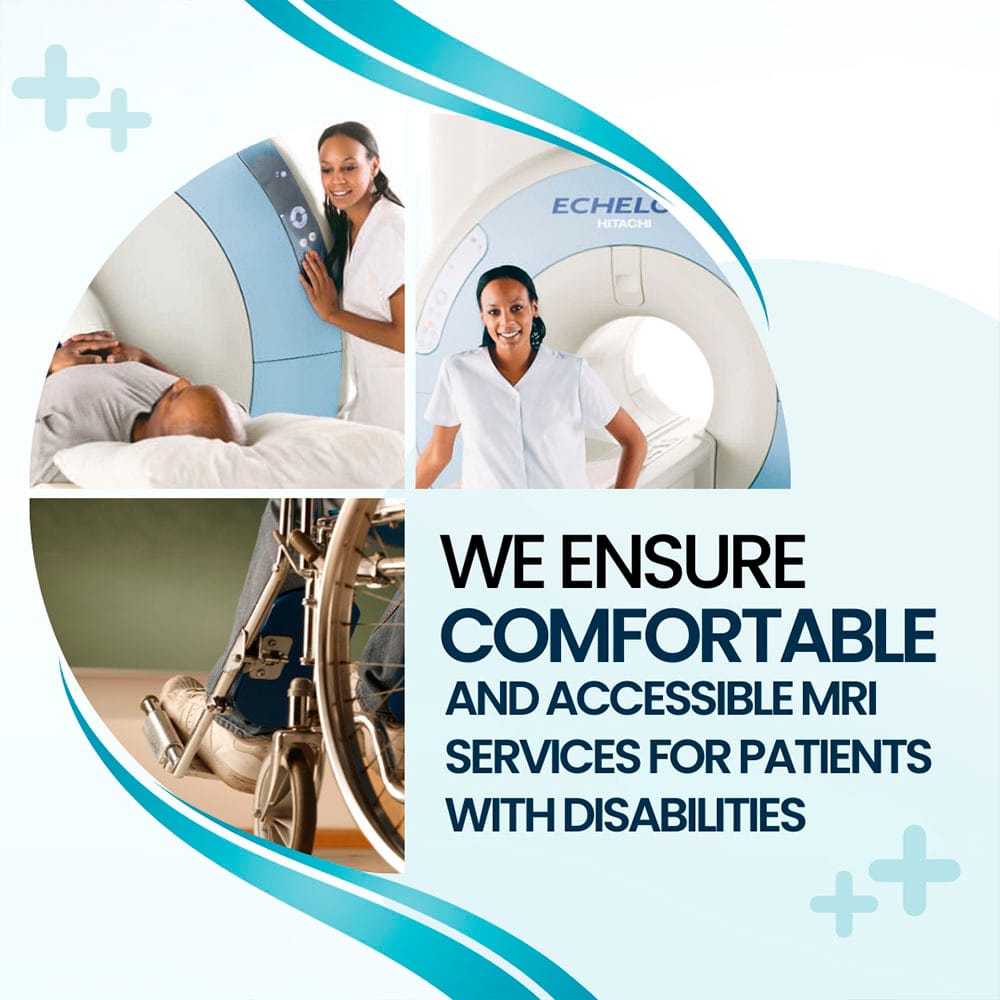 MRI for disabled individuals is not as easy as it is for others. People who cannot lie down due to an injury, disability, or some other problem may require additional help to get their MRI done. At Manhattan MRI Imaging Center, we offer accessible MRI services to ensure no disabled individual faces problems getting their test done. We understand the problems that result from mobility restrictions and have non-magnetic accessories, designed specifically for use in MRI facilities for patients using wheelchairs and walkers. Our trained and experienced staff focuses on making the scanning process most comfortable and accessible for all patients.
MRI for disabled individuals is not as easy as it is for others. People who cannot lie down due to an injury, disability, or some other problem may require additional help to get their MRI done. At Manhattan MRI Imaging Center, we offer accessible MRI services to ensure no disabled individual faces problems getting their test done. We understand the problems that result from mobility restrictions and have non-magnetic accessories, designed specifically for use in MRI facilities for patients using wheelchairs and walkers. Our trained and experienced staff focuses on making the scanning process most comfortable and accessible for all patients.
An MRI is a powerful diagnostic test that helps doctors identify, evaluate, and treat certain medical conditions, from broken bones to tumors and cancers. However, for individuals with mobility issues or disabilities, undergoing an MRI can be challenging. This is because nothing metal or electronic is allowed inside the MRI room, and wheelchairs or walkers used by people with limited mobility may not be compatible with the MRI technology.
If you cannot lie down on the scanning table due to a disability issue, you may need MRI-accessible wheelchairs and accessories. Discuss your limitations with your doctor to learn what they are and how they can help you go through an MRI scan comfortably.
Imaging tests like MRIs can be difficult for individuals with physical limitations, from maneuvering on and off the table to getting into the right position for an exam. Many people who have been recommended an MRI for diagnostic and treatment purposes face problems because of accessibility issues, as everything in the room should be MRI-compatible.
To conduct a successful diagnostic test, it is important to ensure nothing magnetic comes within the propinquity of the machine. It is not only people like radiology technicians and patients, but anyone who comes near the machine must abide by the ‘no ferrous material inside’ rule. It is because the MRI machines are always ‘on’, and it is far too expensive and time-consuming to power them down, which means a strong magnetic pull is always present. The metal in wheelchairs, crutches, or walkers can disrupt the magnetic field, affecting the imaging process.
The magnetic resonance imaging (MRI) machine uses magnetic waves, and these electromagnetic waves are most important. The MRI machine has a strength of 0.5T to 5 Tesla, roughly a thousand times more than the earth’s magnetic field strength. It means that anything magnetic in the room will be dangerously attracted to the MRI machine within no time.
There have been accidents in the MRI environment mainly due to the presence of wheelchairs routinely used in hospitals as they are made from metal, which is magnetically attracted to an MRI machine. Even objects as ubiquitous and benign as chairs, medical gas cylinders, and floor polishers can get magnetically attracted with huge force and become life-threatening.
MRI scans can be made easy for disabled patients by selecting the approved metal for a magnetic environment. This can be done by looking for the type of metal that is MRI or non-magnetic, also known as non-ferrous or non-ferromagnetic.
Some common non-ferrous metals include:
Aluminum is by far the most common MRI-compatible agent. It is an excellent material for making MRI-safe products as it is feather light, as well as strong, in addition to being non-magnetic. It is hard and durable, more than any other non-ferrous metals.
MRI-safe accessories such as wheelchairs, walkers, or stretchers make it easy for disabled or limited mobility patients to go through this diagnostic test, necessary for evaluating potential medical conditions or planning treatment for their existing issues.
These items are essential for the safety and convenience of patients who need to undergo this imaging test. They are made from non-ferrous materials, which means they are not harmful to the patient, disrupt the imaging process or image quality.
Benefits of MRI-compatible accessories:
MRI-safe wheelchairs make the imaging facility accessible to disabled patients or people with limited mobility and other medical conditions and help them seek timely care. They also enable technologists and radiologist staff to provide the best medical imaging services without fear of harm.
They are the best choice for the following reasons:
The wheelchairs come with customizable options to address the needs of individual patients, from adjustable seating positions to specialized headrests and supports. These features enable healthcare providers to tailor the scanning process to each patient’s unique requirements. This high level of customization not only improves comfort but also results in optimal image quality during the scan.
Ensuring safety protocols, as well as patient health and convenience is the top priority of every imaging facility. At Manhattan MRI, you can look forward to getting the best diagnostic assistance for patients with disabilities, medical conditions, or limited mobility. Our staff is highly trained and compassionate and provides the best support to patients who require enhanced safety and customizable assistance. We ensure the highest quality scanning services and better care for all patients to ensure their satisfaction and long-term well-being.